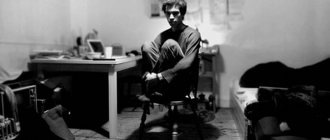Greetings, friends! Here I will talk about such a very unpleasant type of fear as cancerophobia. According to my observations, it appears in most people suffering from neurosis and is very mentally exhausting. This misfortune did not spare me either, so I know from myself what it’s like to constantly have thoughts about a serious illness in my head. Not only is the physical condition exhausting, but there are also constant stupid thoughts in my head.
Here I will talk about what cancerophobia is and share my views on how to get rid of obsessive fear and why it is dangerous.
Cancerophobia - what is it?
What is cancerophobia? This is the fear of getting cancer. The fear of getting cancer may hide other fears. For example, a phobia may be associated with fear of death, loneliness, helplessness, or disability. Additionally, there may be a fear of loss of external attractiveness.
Carcinophobia (carcinophobia) is a type of hypochondria (a mental disorder in which a person is overly concerned about his health) and nosophobia (a collective name for the fear of disease). Hypochondriacs study scientific medical literature, visit doctors, get tested, and look for symptoms of diseases. If doctors say that the tests are normal, then the hypochondriac goes to other doctors or diagnoses himself and prescribes treatment.
What else is characteristic of the patient’s behavior (cancerophobia, symptoms and signs):
- mood swings and emotional instability;
- inadequate emotional reactions (tearfulness, touchiness, irritability);
- increased anxiety at the slightest discomfort or symptom, for example, colic, headache, nausea;
- decreased cognitive abilities (problems with attention, memory);
- fear of cancer patients (cancer phobe avoids them);
- problems with sleep, loss of appetite, general weakness caused by nervous overstrain (the patient does not understand the cause-and-effect relationships and takes these symptoms for manifestations of cancer, which is why he is even more afraid);
- preoccupation with one’s well-being, constant discussion of illnesses;
- passion for cancer prevention (taking dietary supplements, playing sports, diet, cleansing the body).
If a person discovers some symptom or receives a conclusion about bad tests, sees an ambulance or comes across a film about cancer patients, this can lead to panic and hysteria, psychosis. But the problem is that panic attacks are the cause and consequence of deterioration in well-being. The more anxious the patient is, the more often panic attacks occur. And the more often panic attacks occur, the worse the cancerophobe feels. It turns out to be a vicious circle.
Symptoms of the disease in various patients
Manifestations of phobia may differ from patient to patient - some begin to constantly consult doctors and undergo all kinds of examinations. Often they come to see a doctor with a self-made diagnosis or present a large number of different complaints. The other category, on the contrary, tries in every way to avoid visiting doctors, even if they have diseases, explaining that the first visit to the doctor will confirm the presence of cancer in the last stage, and ignorance is better than firm confidence in the disease.
The degree of frankness of patients in communicating with people around them also varies. Persons suffering from hysteria will in every possible way focus attention on their painful condition, reduce all conversations to this topic, and demonstrate their suffering.
Anxious individuals (or those with obsessive-compulsive disorder), on the contrary, will experience their condition alone, without communicating their suspicions to anyone. In such cases, loved ones guess about the patient’s condition only by indirect signs - transformation of behavior, study of specialized literature, spilling out of emotions when mentioning cancer.
The slightest mention of cancer spoils the mood of a patient with cancer phobia for a long time. There is excitement, concern or, conversely, internal numbness and inhibition. In especially severe cases - confusion, racing thinking. Attempts to convince the patient and explain the groundlessness of fears cause violent protest and objections; the patient tries to quickly end the unpleasant conversation.
Causes of cancerophobia
There are several reasons for the development of cancerophobia:
- the death of someone close to cancer or observing someone’s illness (a cancer phobe saw someone suffering, losing health and attractiveness);
- the presence of chronic diseases that can develop into cancer (gastritis, ulcers, benign neoplasms);
- suspiciousness and suggestibility (careless words of a doctor, reports from the media can have an impact);
- frequent contacts with cancer patients;
- cases of cancer in the family.
It is important! For a long time, cancer develops asymptomatically, and in later stages it is practically untreatable. The specificity and aggressiveness of the disease frightens carcinophobes.
Categories of people
Patients who exhibit a fear of cancer can be divided into three categories:
- People who have had this disease feel fear of relapse. The main reasons that can cause obsessive fear are psychological and physiological disorders in the body due to the experience.
- Persons around whom someone has already become ill or has had this disease. You can often hear from such people: “I’m afraid that this will be passed on to me by inheritance!”
- Individuals influenced by the media.
Types of phobias
Speaking about cancerophobia, it is worth considering two of its manifestations: fear in cancer patients or people in remission and fear in healthy people. The latter begin to worry about their health when they feel one of the popular symptoms of the disease - pain. Let's consider these cases in more detail.
Cancerophobia in cancer patients
If cancer is detected at an early stage, in 90% of cases it is treatable. But success depends on the client’s positive attitude and his desire to fight.
How does canceraphobia manifest in cancer patients?
- unwillingness to fight;
- passivity;
- feeling of helplessness;
- demonstration of helplessness and weakness;
- depressive tendencies.
Cancer patients with cancerophobia feel sorry for themselves, complain about their fate and are in a state of extreme stress. Because of this, their health deteriorates even more.
For pain
Pain is a symptom of most diseases, including cancer. But the problem is that the symptom can be psychosomatic, that is, the person actually feels pain, but the diagnosis does not reveal any disorders or pathologies. The difficulty is that pain is the result of fear, suspiciousness and chronic stress.
Prevention
The main recommendation for preventing the development of a pathological condition called cancerophobia is the need to lead a healthy lifestyle.
We should not forget that an indicator of health can be participation in different areas of life - work, communication with friends, passion for what you love. In addition, the prerequisites for good health and victory over anxiety can be found in sports, travel, and an active social life. Advice on a balanced diet and proper rest, despite all its banality, is also necessary to maintain psychological comfort.
How to get rid of cancer phobia
How to get rid of the fear of getting cancer? No matter how strange it may sound, before starting treatment, a carcinophobe needs to undergo a medical examination. You need one full examination in a good clinic, which will exclude the presence of cancer pathology and after which you need to stop visiting doctors. After this, you can correct your mental state.
Self-deliverance
In the early stages, you can cope with the phobia on your own. To do this, you need to realize and admit the problem, and then realize the irrationality of fear.
How to deal with cancerophobia:
- All worries, fears and negative thoughts live exclusively in your head. Realize that you yourself are the source of your suffering.
- Avoid medical literature. Leave the forums and sites where you were looking for information, remove all posters, give the literature to the library or put it in a distant drawer.
- Stop talking about illnesses. Ask your friends to stop your attempts to start a conversation about diseases.
- Find passion, meaning and purpose in life. There must be something in your life that is stronger than fear.
- Learn to transform negative thoughts into positive ones. Use willpower to switch your mind when you catch yourself thinking negative thoughts.
- Stop being afraid of death and living in an imaginary negative future. If you live in fear of death, it means that you are giving up on life. By trying to avoid death and illness, you avoid life.
- Channel your imagination and energy into creative, productive channels.
It is important to understand that cancer at an early stage is highly treatable. In addition, modern medicine is able to alleviate and slow down the course of the disease and improve the quality of life of patients. There is no need to treat cancer as something terrible, treat it like a cold.
It is important! There is no need to get hung up on the idea of getting rid of a phobia. You need to love life and get carried away by self-realization, then gradually the fear will recede by itself.
Help from a psychologist
Psychotherapists and clinical psychologists treat cancerophobia. Psychoanalysis is used to identify the root cause of fear. It is necessary to look into the patient’s subconscious and understand what kind of fear is hidden behind cancerophobia, which has become a psychological trauma. After this, a treatment plan is drawn up individually. A specialist will help you find the cause of your fear of getting cancer and tell you how to get rid of it.
Chronic tension leads to muscle tension, deterioration of oxygen and blood circulation, vasoconstriction, and metabolic disorders. Therefore, in advanced stages of the disease, drug treatment may be necessary. Symptomatic therapy is aimed at restoring normal organ function and reducing anxiety. For panic attacks and psychosis, the use of tranquilizers and antipsychotics is indicated.
Symptoms
Cancerophobia can manifest itself in different ways; medical practice notes symptoms that are characteristic of all categories of people with this diagnosis:
- Confusion and inability to control your emotions and your condition when reminded of the existence of such a disease.
- Anxious thoughts about the possibility of getting cancer prevent a cancerophobe from living normally and concentrating on important aspects of life.
- A person understands that his beliefs are groundless, he cannot cope with them on his own.
Such symptoms negatively affect the entire body and lead to serious psychological and physiological disorders.
Let's consider what happens to such a person from the point of view of psychology and physiology.
Anxious thoughts interfere with normal human activities
Physical
In this case, symptoms of deterioration in general condition appear:
- dizziness;
- trembling of limbs;
- body temperature rises to 37-38 °C;
- rapid heartbeat and chest pain;
- nausea, vomiting;
- difficulty breathing, shortness of breath, feeling of lack of air.
Psychological
The obsessive fear of cancer has a negative impact on the nervous system and brain. This effect is manifested through:
- constant concern about upcoming events related to oncology;
- a constant desire to avoid places where there is a risk of this disease;
- a feeling of fear of discovering a malignant tumor;
- irritability, anger at oneself and a feeling of hopelessness.
Mental
This symptomatology manifests itself on a subconscious level:
- obsessive thoughts about cancer;
- fear of losing self-control, going crazy and losing consciousness;
- inability to switch to other thoughts;
- a feeling of unreality of current events.
Often the symptoms of oncophobia manifest themselves with low intensity. In this case, you can help the person yourself by trying to calm him down and asking him to relax.
Often, the fear of cancer phobia can develop so much that a person may experience panic attacks. Just the thought of this disease can cause this phenomenon.
Symptoms of a panic attack
First aid for manifestations of phobia
If you notice signs of a phobia or are experiencing panic attacks, you should immediately consult a psychotherapist. He will prescribe treatment.
What to do if a panic attack takes you by surprise (cancerophobia, treatment of a panic attack):
- inhale slowly and deeply, hold your breath for a few seconds, exhale slowly, repeat several times;
- get distracted by something, concentrate on counting, your breathing, passing cars, etc.;
- try to remember something pleasant;
- try to go to a calm and secluded place; if there is a person you know next to you, then turn to him for help (ask him to support you, to take you to another place).
Psychological methods
If a person is afraid of contracting cancer, you need to bring him up to date and tell him how cancer cells arise, and that they are not transmitted from a sick person to a healthy person in any way. Cancerophobia must be treated by gradually removing the patient from a state of panic.
You should not dissuade him that following certain rules and recommendations to improve the quality of life will help him avoid cancer; in fact, proper nutrition and renunciation of bad habits will only be beneficial. In addition, cancerophobia can be viewed from a positive side. Typically, such patients unquestioningly undergo all tests and examinations, so part of the population is already excluded from the risk group for cancer.
If you refuse to prescribe tests and preventive measures to cancerophobes, they will turn to unconventional methods of treating a non-existent disease, which will worsen their situation. Treatment of cancerophobia often ends in a psychiatric department.
What do neglected cases lead to?
Constant tension and fear turn into chronic stress for the body. Due to increased production of adrenaline and other changes caused by stress, the functioning of the body's main systems deteriorates. The gastrointestinal tract and cardiovascular system are primarily affected. There is also a gradual decrease in immunity. All this together can lead to a person actually getting cancer.
Other consequences of a phobia include an unhealthy passion for traditional medicine (in an attempt to improve one’s health, a person can drink a life-threatening solution), nervousness, aggressiveness, and isolation. Often a person is isolated at home, but this does not reassure him, because the exact reasons for the development of cancer have not been identified.
Drug treatment
There are different methods of combating this disease, both traditional and non-traditional. In modern medicine, to cure this disease, specialists use anxiolytic drugs. Let's look at how to eliminate a disease that has developed using these means.
Benzodiazepines
The most effective and popular drugs in this group are Gidazepam, Diazepam and Alprazolam. These medications have a sedative, hypnotic and anti-anxiety effect. Under the influence of active substances, pronounced emotional manifestations are suppressed in a person: breakdowns, irritability, anxiety and panic. The nervous system calms down.
With long-term use of drugs, this disease is suppressed, and a person may become addicted and physically dependent on the drugs. Treatment should be supervised by a doctor.
Gidazepam has a sedative effect
Beta blockers
The drug Anaprilin is recognized as the best remedy in this group. It suppresses the effect of adrenaline in the blood, the cancerophobe’s heart rate normalizes, tremors and anxiety go away. Beta blockers affect physiological factors more than emotional and mental ones.
Antidepressants
These powerful medications cause many side effects, one of the most common being addiction.
It is almost impossible to overcome the fear of cancer with medication. As practice shows, drugs provide only a temporary effect and relieve symptoms. After completing the course of treatment, all symptoms of fear of cancer resume.
Medications poison the body, cause psychological and physiological dependence and do not change mental and behavioral patterns.
Some experts argue that you can get rid of cancer phobia if you completely abandon drug treatment. If you have already started a course of treatment, you should consult a doctor before stopping it. Abruptly stopping treatment may be dangerous to your health.
Antidepressants do not cure a phobia, but eliminate its symptoms











